Saturday, April 21, 2007
A Terrorist Goes Free
Today there was an excellent Op-Ed article in the New York Times by Venezuelan ambassador to the U.S., Bernardo Alvarez, on the release of Luis Posada. It speaks for itself so without further introduction:
But I do have to say one thing. I love the way Alvarez weaves the events of April 11th into this article. Indeed the times, which was gleefull at the coup that overthrew Chavez, should never be allowed to forget what happened that day and by implication how they revealed some pretty anti-democratic feelings.
|
AFTER the attacks of Sept. 11, President Bush forcefully argued that it was every country’s duty to fight international terrorism. He made the case that sponsoring terrorism or simply looking the other way when it happened were equivalent acts, and the United States would stand for neither. But holes have started appearing in that principle, courtesy of a single Venezuelan terrorist, released this week from a New Mexico prison on bail.
In early 2005, Luis Posada Carriles, a Venezuelan with a long history of violent attacks in Latin America, sneaked into the United States and was soon arrested. Mr. Posada had escaped from a Venezuelan prison while awaiting trial in the bombing of a Cuban airliner in 1976 that killed 73 people, including all 24 members of Cuba’s youth fencing team and several Guyanese medical students. This was the deadliest attack on a civilian airliner in the Western Hemisphere in history — until 9/11.
Upon Mr. Posada’s capture, the government of President Hugo Chávez demanded his extradition. But the Bush administration has refused to extradite Mr. Posada to Venezuela or Cuba, claiming that it fears he will be tortured in those countries. In fact, Washington’s reluctance is more likely linked to Mr. Posada’s history as a Central Intelligence Agency operative and a darling of extremist sectors of the powerful Cuban-American community in Florida (he tried to assassinate Fidel Castro with C-4 explosives placed in an auditorium packed with students in Panama in 2000). Twenty-two months have passed since Venezuela formally asked for his extradition, offering 2,000 pages of documentary evidence to substantiate its claim, yet the State Department has not even acknowledged receiving the request.
Nor has Mr. Posada been charged with the 1976 attack, even though declassified Central Intelligence Agency documents indicate that his role has long been accepted as fact. Instead, he faces charges of immigration fraud, a travesty that could be equaled only by charging Osama bin Laden with entering and leaving Pakistan without a visa. Finally, Mr. Posada was released on bail on Thursday, even though he is an obvious flight risk and a violent terrorist.
Of course, Mr. Posada’s case isn’t the first instance related to Venezuela in which the Bush administration has set aside its principles for political expediency. Five years ago last week, the Bush administration gleefully welcomed a coup that overthrew President Chávez, replacing him with a junta that suspended the Constitution, dismissed the National Assembly and dissolved the Supreme Court. Thankfully, the Venezuelan people ensured that their democratically elected president was returned to power two days later.
Just as the Bush administration’s support for the Venezuelan junta undermined its pledge to uphold and promote democracy around the world, allowing Mr. Posada to avoid prosecution for a vicious attack he can credibly be accused of masterminding throws into doubt the sincerity of President Bush’s war on terrorism. Mr. Posada is a terrorist, regardless of the cause he fought for or the allies he might have. The Bush administration’s foot-dragging on his extradition and its failure to even classify him as a terrorist is unconscionable.
Last week, Venezuelans celebrated the return of democracy after the coup against President Chávez. But they continue to mourn the 73 people killed aboard that civilian airliner. If President Bush is serious about the principles he set out after 9/11, he need only look to Venezuela and correct the mistakes he can. The coup has passed, but the chance to extradite or prosecute Mr. Posada hasn’t.
Bernardo Álvarez Herrera is Venezuela’s ambassador to the United States.
But I do have to say one thing. I love the way Alvarez weaves the events of April 11th into this article. Indeed the times, which was gleefull at the coup that overthrew Chavez, should never be allowed to forget what happened that day and by implication how they revealed some pretty anti-democratic feelings.
|
Friday, April 20, 2007
Metro Cable construction starts
As I've blogged on extensively before a gondola system will be built in Caracas to help residents of mountainside barrios more easily reach there homes.
Today shovel was put to earth as construction was begun on the first gondola.
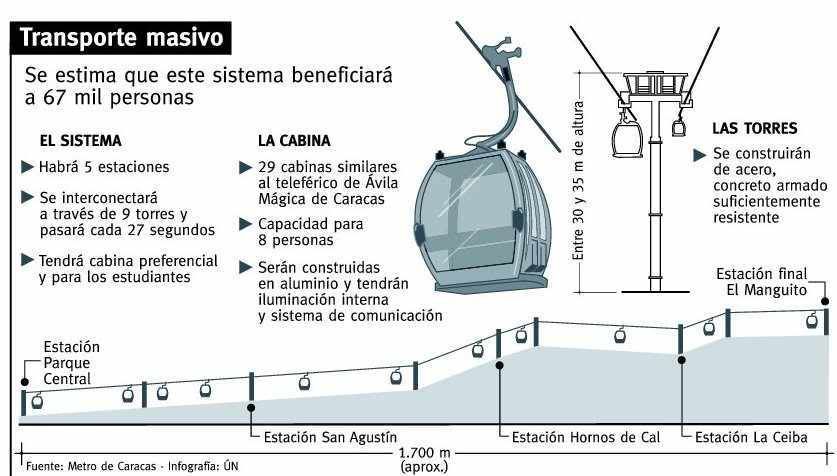
This first one will benefit an estimated 67,000 people. It will be about a mile long and will have five stations. It is expected to be completed by March 2008. Ultimately there will be 9 of these systems.
Incidently, there are no elections scheduled for March 2008. Hmmm, maybe Chavez is building something just because it is needed, not to win an election as his opponents always complain.
|
Today shovel was put to earth as construction was begun on the first gondola.

This first one will benefit an estimated 67,000 people. It will be about a mile long and will have five stations. It is expected to be completed by March 2008. Ultimately there will be 9 of these systems.
Incidently, there are no elections scheduled for March 2008. Hmmm, maybe Chavez is building something just because it is needed, not to win an election as his opponents always complain.
|
Trying to get on the bandwagon
Manuel Rosales - name sound familiar? It should. That is the poor sap the opposition had run against Chavez last year who lamely got 37% of the vote.
Interestingly it sometimes seems Rosales doesn't realize the election is over, sort of like those long lost Japanese soldiers that kept popping up on isolated islands long after WWII ended. No one would care, save for the fact that Rosales keeps pissing away lots of Venezuelan tax money taking out ads trying to do...what? Raise his name recognition? Here is one such ad from today's paper:
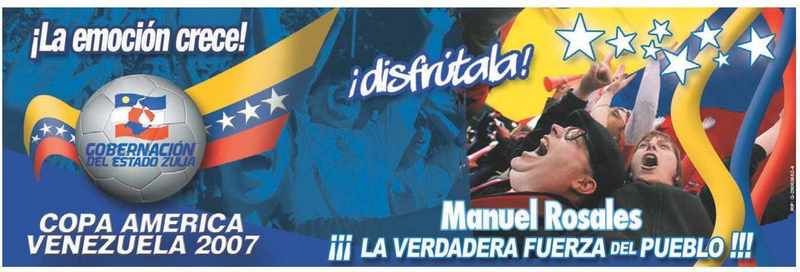
So now Rosales is all excited about the South American soccer tournament, Copa America. Of course, it is Chavez who brought this tournament to Venezuela and it is Chavez's government has has been building and sprucing up stadiums across the country. But the opposition is, if nothing else, full of oppertunists and bandwagon jumpers. So leave it to Rosales to try to hop on to what is a good thing.
I suppose their is some logic to it. If he keeps it up with all the advertisements maybe he'll actually get 40% of the vote next time.
|
Interestingly it sometimes seems Rosales doesn't realize the election is over, sort of like those long lost Japanese soldiers that kept popping up on isolated islands long after WWII ended. No one would care, save for the fact that Rosales keeps pissing away lots of Venezuelan tax money taking out ads trying to do...what? Raise his name recognition? Here is one such ad from today's paper:

So now Rosales is all excited about the South American soccer tournament, Copa America. Of course, it is Chavez who brought this tournament to Venezuela and it is Chavez's government has has been building and sprucing up stadiums across the country. But the opposition is, if nothing else, full of oppertunists and bandwagon jumpers. So leave it to Rosales to try to hop on to what is a good thing.
I suppose their is some logic to it. If he keeps it up with all the advertisements maybe he'll actually get 40% of the vote next time.
|
Thursday, April 19, 2007
Wasn't there supposed to be a "war against terrorism" or something?
Statements by U.S. political leaders such that there is a "war against terrorism" or we are "fighting to spread democracy" should always be taken for what they are - complete BS that primarily serve as justification for the U.S. to do what it pleases.
They say they invaded Iraq in part to bring democracy to it - funny, if they wanted to help the spread the democracy maybe they could have just stopped giving billions of dollars to the dictatorship that rules Egypt. They also claimed that they invaded to stop the spread of weapons of mass destruction. Yet when a dictator they favor, in Pakistan, gets them they don't seem too concerned.
As for the "war on terrorism" that they used as a pretext to invade Afghanistan and overthrow its government doesn't seem as if there really is much of any war. Just today they let an alledged terrorist in their custody walk right out of jail:
Interestingly they neglect to mention that it was Venezuela that actually requested extradition and the U.S. turned it down. Anyways, when the Taliban refused to immediately give in to U.S. demands to turn over Bin Laden the U.S. promptly started bombing the place. I guess its lucky for the U.S. Venezuela doesn't have any cruise missiles.
|
They say they invaded Iraq in part to bring democracy to it - funny, if they wanted to help the spread the democracy maybe they could have just stopped giving billions of dollars to the dictatorship that rules Egypt. They also claimed that they invaded to stop the spread of weapons of mass destruction. Yet when a dictator they favor, in Pakistan, gets them they don't seem too concerned.
As for the "war on terrorism" that they used as a pretext to invade Afghanistan and overthrow its government doesn't seem as if there really is much of any war. Just today they let an alledged terrorist in their custody walk right out of jail:
CBS4) MIAMI An anti-Castro Cuban militant is on his way back to Miami to await trial on immigration fraud charges.
Luis Posada Carriles was released Thursday from a jail in New Mexico after posting a $250 thousand bond.
The former CIA operative, who admitted to entering the country illegally from Mexico two years ago, was indicted on charges of lying to immigration authorities while trying to become a naturalized U.S. citizen. Federal prosecutors had fought to keep Posada jailed until his trial, but an appeals court in New Orleans rejected their plea.
The 79-year old Posada is wanted in Cuba in connection with the 1976 bombing of a Cuban jetliner that killed 73 people, a charge Posada denies.
Posada was arrested in Venezuela a few days after the bombing and escaped from prison there in 1985 before a civilian trial in the case was completed.
In May 2005, he was picked up in Miami for entering the U.S. illegally from Mexico. During a hearing on the matter, an immigration judge ruled that he cannot be sent to Cuba or Venezuela, citing fears that he would be tortured.
Posada, who trained with the CIA for the 1961 Bay of Pigs invasion, served in the U.S. Army in the early 1960s. In 1965, he allegedly plotted to overthrow the Guatemalan government and blow up a Soviet or Cuban freighter in Mexico. Two years later, according to the FBI, he moved to Venezuela and wound up running its counterintelligence agency until he set up his own security firm in the mid-1970s.
In 1973, Posada was investigated by the CIA for allegedly smuggling cocaine, but was later cleared.
In South Florida, Posada is hailed as a hero by many in the Cuban exile community for his efforts to rid Cuba of the communist regime, but others blame him of being a terrorist.
Interestingly they neglect to mention that it was Venezuela that actually requested extradition and the U.S. turned it down. Anyways, when the Taliban refused to immediately give in to U.S. demands to turn over Bin Laden the U.S. promptly started bombing the place. I guess its lucky for the U.S. Venezuela doesn't have any cruise missiles.
|
Tuesday, April 17, 2007
The bright lights that brought Venezuela to ruin
In flipping through a recent presentation on Venezuela’s social composition I ran across this slide:
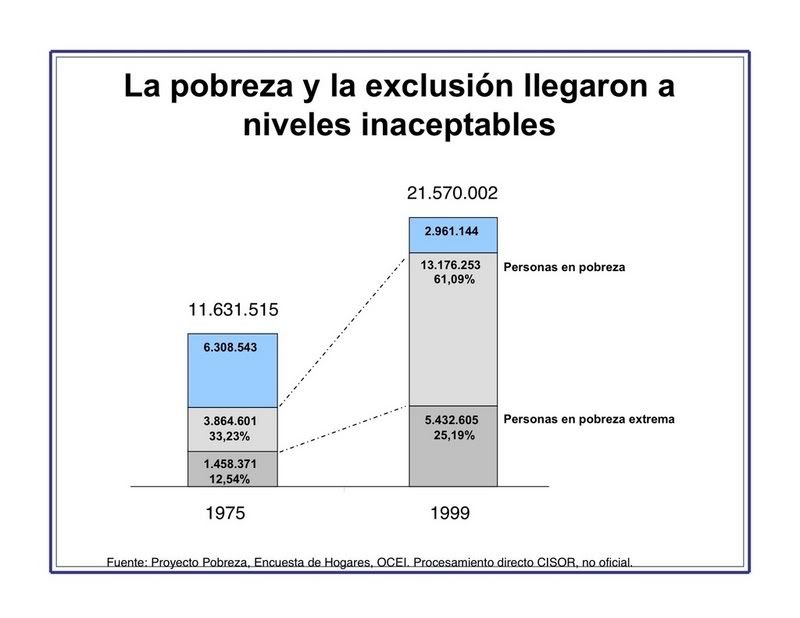
The numbers in blue show Venezuelans not in poverty, the light grey represents Venezuelans in poverty, and the dark grey shows Venezuelans in extreme poverty.
Now, we needn’t focus on the exact number and percentages, they may well overstate poverty somewhat. Yet the dramatic trend can’t be missed. Venezuela went from a country with a large middle class to a country that was mainly impoverished. The downward trend in the standard of living over those 24 years simply can’t be missed nor downplayed – a very large portion of Venezuelan society was brought to ruin.
Fortunately, we’ve seen this trend start to be reversed in recent years with decreasing poverty, rising incomes and more jobs being created by the Chavez government.
The question is, how could this social and economic implosion have been allowed to happen over 24 years? Who was minding the store – or better put, was asleep at the wheel, while this s occurred?
The truth is it had many “fathers”. Yet there is no small irony in who played a very prominent role – the same people who critique Chavez’s every move, who now pretend to have all the answers, yet who when they had their chance in the government looked like a deer in the headlights.
Lets look at some examples. Moises Naim would be one. With graduate degrees from M.I.T. and stints at the World Bank and Carnegie Endowment for International Peace he would seem to be part of the Venezuelan “best and brightest”.
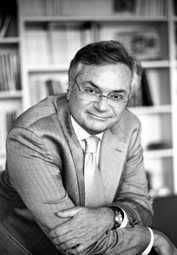
Moises Naim
So too would Ricardo Hausmann with his Ivey League economics PhD and Gerver Torres of Venezuela’s elite business school, the IESA.
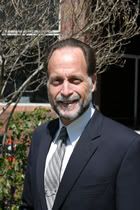
Ricardo Hausmann
You’ve probably heard their names before, if for no other reason than they haven’t shied away from criticizing all the supposed shortcomings of the Chavez administration – Naim from his perch as the editor of Foreign Policy Magazine, Hausmann from the Harvard’s Kennedy School of Government and Torres from his own “Leadership and Vision”organization.
Yet in all their rants there is one thing you will seldom hear – that they all served in the cabinet of Carlos Andres Perez’s government in the early 1990s. Naim was the Minister of Trade and Industry, Hausmann the Minister of Planning, and Torres the Minister of Privatization. In other words, these three bright lights pretty much had control over all economic policy making for several years.
How did Venezuela fare under their stewardship? Well, lets just way, when the adults finally arrived to clean up their mess Venezuela faced the collapse of virtually its entire banking sector, hyper-inflation on a scale it had never previously known, and the shunting of millions more Venezuelans into poverty. In short these “doctors” were responsible for a bad case of economic malpractice.
Yet, the “IESA Boys” weren’t the only know it alls to play a key role in driving Venezuela into a ditch. Where they left off Teodoro Petkoff, an erstwhile “socialist”, picked up. Petkoff had spent more than a decade in the Venezuelan congress and run for president several times with nothing much to show for it. Yet in the mid-90s he was tapped to be Planning Minister in the Caldera government. At the same time Luis Guisti was given free reign as president of the state oil company, PDVSA.
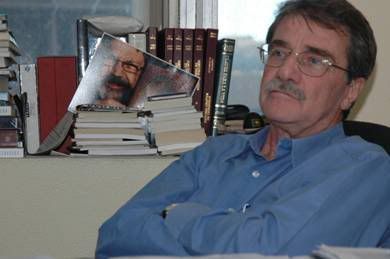
Teodoro Petkoff
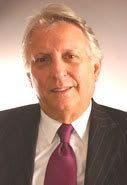
Luis Giusti
Now, you might not know it from Petkoff’s Tal Cual newspaper, which makes it seem as governing a country is a snap and any and all shortcomings are just Chavista incompetence, but Petkoff’s performance was hardly something to brag about. When he got through implementing his neo-liberal “Agenda Venezuela” the country had gone from slow growth to a sharp recession and when he left office he left behind a mess that included billions in unpaid back wages for civil servants (it took the Chavez administration until 2002 to pay off all the unpaid bills left behind by Petkoff).
While Petkoff was busy trashing the country as a whole Giusti was doing the same to Venezuela’s oil industry. Despite its bloated payroll it couldn’t even perform basic tasks like refining unleaded gasoline so one could smell Caracas before actually arriving there (the U.S. EPA actually banned Venezuelan refined gasoline in 1995). With OPEC quota busting production hikes, give away contracts to foreign oil companies and the duplicitous funneling of money overseas Giusti oversaw the tanking of oil prices and a stunning reduction on the revenues provided to the government. Although Chavez immediately fired Giusti upon assuming office such was the damage that it took years to get Venezuela’s oil industry turned around.
Read a newspaper article on Venezuela or read one of the “academic” papers on Venezuela and you are likely to run across these individuals. If nothing else, they know how to run their mouths, get in front of TV cameras, and make their way onto the Rolodex’s of reporters. Yet when it was their turn to walk the walk, they failed miserably. Doubt that statement? Take a good at the chart on top again.
Nevertheless, as much as they failed for the country they seem to have done very well for themselves - some have nice perches in think-tanks, others apparently made enough money to have their own investment firms, and yet others managed to get their own newspapers. It would appear being a cabinet member in the government of someone like Carlos Andres Perez can be quite rewarding.
Yet it may be all for the best. These people are now left to do what they do best – run their mouths. Venezuela now has a government that knows how to actually govern. And most importantly the Venezuelan people are a lot less likely to be dazzled by slick talking people with all the “right” degrees who don’t really turn out to be the best and the brightest after all.
|

The numbers in blue show Venezuelans not in poverty, the light grey represents Venezuelans in poverty, and the dark grey shows Venezuelans in extreme poverty.
Now, we needn’t focus on the exact number and percentages, they may well overstate poverty somewhat. Yet the dramatic trend can’t be missed. Venezuela went from a country with a large middle class to a country that was mainly impoverished. The downward trend in the standard of living over those 24 years simply can’t be missed nor downplayed – a very large portion of Venezuelan society was brought to ruin.
Fortunately, we’ve seen this trend start to be reversed in recent years with decreasing poverty, rising incomes and more jobs being created by the Chavez government.
The question is, how could this social and economic implosion have been allowed to happen over 24 years? Who was minding the store – or better put, was asleep at the wheel, while this s occurred?
The truth is it had many “fathers”. Yet there is no small irony in who played a very prominent role – the same people who critique Chavez’s every move, who now pretend to have all the answers, yet who when they had their chance in the government looked like a deer in the headlights.
Lets look at some examples. Moises Naim would be one. With graduate degrees from M.I.T. and stints at the World Bank and Carnegie Endowment for International Peace he would seem to be part of the Venezuelan “best and brightest”.

Moises Naim
So too would Ricardo Hausmann with his Ivey League economics PhD and Gerver Torres of Venezuela’s elite business school, the IESA.

Ricardo Hausmann
You’ve probably heard their names before, if for no other reason than they haven’t shied away from criticizing all the supposed shortcomings of the Chavez administration – Naim from his perch as the editor of Foreign Policy Magazine, Hausmann from the Harvard’s Kennedy School of Government and Torres from his own “Leadership and Vision”organization.
Yet in all their rants there is one thing you will seldom hear – that they all served in the cabinet of Carlos Andres Perez’s government in the early 1990s. Naim was the Minister of Trade and Industry, Hausmann the Minister of Planning, and Torres the Minister of Privatization. In other words, these three bright lights pretty much had control over all economic policy making for several years.
How did Venezuela fare under their stewardship? Well, lets just way, when the adults finally arrived to clean up their mess Venezuela faced the collapse of virtually its entire banking sector, hyper-inflation on a scale it had never previously known, and the shunting of millions more Venezuelans into poverty. In short these “doctors” were responsible for a bad case of economic malpractice.
Yet, the “IESA Boys” weren’t the only know it alls to play a key role in driving Venezuela into a ditch. Where they left off Teodoro Petkoff, an erstwhile “socialist”, picked up. Petkoff had spent more than a decade in the Venezuelan congress and run for president several times with nothing much to show for it. Yet in the mid-90s he was tapped to be Planning Minister in the Caldera government. At the same time Luis Guisti was given free reign as president of the state oil company, PDVSA.

Teodoro Petkoff

Luis Giusti
Now, you might not know it from Petkoff’s Tal Cual newspaper, which makes it seem as governing a country is a snap and any and all shortcomings are just Chavista incompetence, but Petkoff’s performance was hardly something to brag about. When he got through implementing his neo-liberal “Agenda Venezuela” the country had gone from slow growth to a sharp recession and when he left office he left behind a mess that included billions in unpaid back wages for civil servants (it took the Chavez administration until 2002 to pay off all the unpaid bills left behind by Petkoff).
While Petkoff was busy trashing the country as a whole Giusti was doing the same to Venezuela’s oil industry. Despite its bloated payroll it couldn’t even perform basic tasks like refining unleaded gasoline so one could smell Caracas before actually arriving there (the U.S. EPA actually banned Venezuelan refined gasoline in 1995). With OPEC quota busting production hikes, give away contracts to foreign oil companies and the duplicitous funneling of money overseas Giusti oversaw the tanking of oil prices and a stunning reduction on the revenues provided to the government. Although Chavez immediately fired Giusti upon assuming office such was the damage that it took years to get Venezuela’s oil industry turned around.
Read a newspaper article on Venezuela or read one of the “academic” papers on Venezuela and you are likely to run across these individuals. If nothing else, they know how to run their mouths, get in front of TV cameras, and make their way onto the Rolodex’s of reporters. Yet when it was their turn to walk the walk, they failed miserably. Doubt that statement? Take a good at the chart on top again.
Nevertheless, as much as they failed for the country they seem to have done very well for themselves - some have nice perches in think-tanks, others apparently made enough money to have their own investment firms, and yet others managed to get their own newspapers. It would appear being a cabinet member in the government of someone like Carlos Andres Perez can be quite rewarding.
Yet it may be all for the best. These people are now left to do what they do best – run their mouths. Venezuela now has a government that knows how to actually govern. And most importantly the Venezuelan people are a lot less likely to be dazzled by slick talking people with all the “right” degrees who don’t really turn out to be the best and the brightest after all.
|
Sunday, April 15, 2007
Those rascals have a mind of their own
As Ken Livingstone has correctly observed, the opposition to president Chavez is largely based on lies. Lies about the economy, lies about poverty, lies about the oil industry, lies about human rights and lies about the government itself.
One of the principal lies about the government is that it is completely controlled by Chavez. We are told there are no separation of powers and that everything – the Supreme Court, the National Assembly, etc., is subordinate to the executive branch and Chavez himself. The pseudo reporter Phil Gunson gives us a clear example of this line of thought:
For those who read his article I trust they’ll duly note the silliness of many of his assertions such as that he is “commander and chief” of the armed forces. Gee, I’ve heard of other countries where the elected president controls the military and that is usually touted as a positive, “civilian control over the military”, rather than evidence of a dictatorship.
Also, that notion “every member of the 167-seat, single-chamber parliament professes allegiance to Chávez following an opposition electoral boycott in 2005.” is so meaningless as to barely merit comment as he almost acknowledges in the second half of his sentence. Even if the opposition hadn’t boycotted the election there is little doubt Chavez supporters would have won a large majority. So what? Is it a crime to be popular and have people that support you win elections?
If so, than Franklin Roosevelt would have to be considered a leading criminal (or “strongman”, or “populist”, or “demagogue” to name but a few of the adjectives that are applied to Chavez) as he won four presidential terms and had huge majorities in congress, at times over 75%. Clearly, this critique by Mr. Gunson is meaningless reflects little more than the fact that he doesn’t like who is winning the elections.
Moreover, the National Assembly has its own electoral mandate which allows it to do whatever it wants. If it decided to oppose Chavez, there is little he could do. And in fact this has happened many times. Although Chavez and his supporters win elections easily there has been a tendency of some of his supporters to defect to the opposition while in office.
This happened with the previous congress, to the point that Chavez had a very slim majority, and with other key elected officials such as Caracas Mayor Alfredo Pena who won on Chavez’s coattails only to turn against him and actively work to undermine the government. Did Chavez do anything? Did he somehow have these people dismissed from office? No, they were independent powers with their own mandates and remained so until they were voted out of office.
And what about other independent powers, the ones that don’t have independent electoral mandates? In the case of the electoral authorities (the CNE) we’ve seen them flex their muscles. For example, while Chavez cheered on his oil minister when he berated opposition supporters in the oil industry the CNE decided to fine him a months salary for those very same remarks. Clearly the CNE and Chavez aren’t in lockstep.
More importantly, what of the courts? Well, not to long ago the Venezuelan Supreme court made a ruling highly inimical to the interests of the government when it decided at all bonuses and “irregular” income should be exempt from income taxes. That ruling, which will cost the government badly needed tax revenue, certainly created quite a tizzy – yet both the ruling and the court that made it are still standing, as independent as ever.
In fact, recently it made another ruling guaranteed to really push some buttons in the executive branch. Of course, rulings that go against the government are a dime a dozen but given the non-sense being peddled by the likes of Gunson, it is worth taking a look at this one.
During the 02/03 oil strike led by the management of the State oil company, PDVSA, there were some interesting goings on by executives aimed at protecting their jobs. For example, the top executives of PDVSA actually tried to form a union to prevent Chavez from being able to replace them and control oil policy. As the strike fizzled after a couple of months some PDVSA managers claimed they had been unjustly fired because they weren’t really on strike but on vacation or some other type of leave!!
With that in mind it is interesting to look at this the case decided by the court. An executive at a PDVSA affiliate, Maria Lizardo Gramcko, decided to “retire” at the end of January 2003 just as it became clear the strike was failing. Her fellow managers apparently agreed to her retirement package. No sooner than she was out of PDVSA than she sued it for $125,000 because she claimed she was owed “special” payments. PDVSA contested this saying that the PDVSA president at the time, Ali Rodriguez, had not approved the arrangement.
In the first court to hear the case, the Superior Court of Caracas, Gramcko won. PDVSA, as was its right, appealed to the Social Chamber of the Supreme Court which ruled against Gramcko and in favor of PDVSA. Gramcko, wanting her money, appealed again to an even higher body, the Constitutional Chamber of the Supreme Court, and, lo and behold, it ruled in her favor!
Again, lets remember the context here. President Chavez and the PDVSA executives were locked in mortal battle for years. After nearly being overthrown and seeing tens of billions of dollars in damage done to his country Chavez prevailed. Yet now the highest court in the land has opened the door for former PDVSA managers to bring all sorts of suits against the government seeking damages. As Ultimas Noticias puts it in the article there will almost certainly be a “torrent” of cases seeking payment for “special retirements”
I am not a lawyer, much less a Venezuelan one so I cannot pass judgement on this ruling. But I do know this decision sure has to be causing a world of upset to people like Hugo Chavez, Ali Rodriguez, and Rafael Ramirez. I certainly wouldn’t want to have been in the room with any of them when they heard about this decision.
Yet there the Supreme Court stands overturning tax laws, giving pensions to rebellious PDVSA managers, and making all sorts of decision day in and day out that may or may not conform to the wishes of other branches of the government.
Clearly, Mr. Gunson notwithstanding, the various branches of the Venezuelan government are alive and well and have minds of their own.
|
One of the principal lies about the government is that it is completely controlled by Chavez. We are told there are no separation of powers and that everything – the Supreme Court, the National Assembly, etc., is subordinate to the executive branch and Chavez himself. The pseudo reporter Phil Gunson gives us a clear example of this line of thought:
If the frequency of elections in Venezuela were the sole criterion of judgment, the country may be said to be suffering from an "overdose of democracy" - as Paraguay's president, Nicanor Duarte, put it in mid-March 2007 (in what was intended as a compliment). But if the definition of democratic rule includes the checks and balances provided by the separation of powers, Hugo Chávez's government fails to qualify.
First elected in 1998, and re-elected for a second time in December 2006 for a fresh, six-year term, the former army officer used to boast that his 1999 constitution increased from three to five the independent branches of government.
But since coming out of the closet as a "21st-century socialist" inspired by Marx and Lenin, he has accumulated powers more usually associated with a dictatorship. The five branches of government are now effectively extensions of the executive, required to display total loyalty.
For those who read his article I trust they’ll duly note the silliness of many of his assertions such as that he is “commander and chief” of the armed forces. Gee, I’ve heard of other countries where the elected president controls the military and that is usually touted as a positive, “civilian control over the military”, rather than evidence of a dictatorship.
Also, that notion “every member of the 167-seat, single-chamber parliament professes allegiance to Chávez following an opposition electoral boycott in 2005.” is so meaningless as to barely merit comment as he almost acknowledges in the second half of his sentence. Even if the opposition hadn’t boycotted the election there is little doubt Chavez supporters would have won a large majority. So what? Is it a crime to be popular and have people that support you win elections?
If so, than Franklin Roosevelt would have to be considered a leading criminal (or “strongman”, or “populist”, or “demagogue” to name but a few of the adjectives that are applied to Chavez) as he won four presidential terms and had huge majorities in congress, at times over 75%. Clearly, this critique by Mr. Gunson is meaningless reflects little more than the fact that he doesn’t like who is winning the elections.
Moreover, the National Assembly has its own electoral mandate which allows it to do whatever it wants. If it decided to oppose Chavez, there is little he could do. And in fact this has happened many times. Although Chavez and his supporters win elections easily there has been a tendency of some of his supporters to defect to the opposition while in office.
This happened with the previous congress, to the point that Chavez had a very slim majority, and with other key elected officials such as Caracas Mayor Alfredo Pena who won on Chavez’s coattails only to turn against him and actively work to undermine the government. Did Chavez do anything? Did he somehow have these people dismissed from office? No, they were independent powers with their own mandates and remained so until they were voted out of office.
And what about other independent powers, the ones that don’t have independent electoral mandates? In the case of the electoral authorities (the CNE) we’ve seen them flex their muscles. For example, while Chavez cheered on his oil minister when he berated opposition supporters in the oil industry the CNE decided to fine him a months salary for those very same remarks. Clearly the CNE and Chavez aren’t in lockstep.
More importantly, what of the courts? Well, not to long ago the Venezuelan Supreme court made a ruling highly inimical to the interests of the government when it decided at all bonuses and “irregular” income should be exempt from income taxes. That ruling, which will cost the government badly needed tax revenue, certainly created quite a tizzy – yet both the ruling and the court that made it are still standing, as independent as ever.
In fact, recently it made another ruling guaranteed to really push some buttons in the executive branch. Of course, rulings that go against the government are a dime a dozen but given the non-sense being peddled by the likes of Gunson, it is worth taking a look at this one.
During the 02/03 oil strike led by the management of the State oil company, PDVSA, there were some interesting goings on by executives aimed at protecting their jobs. For example, the top executives of PDVSA actually tried to form a union to prevent Chavez from being able to replace them and control oil policy. As the strike fizzled after a couple of months some PDVSA managers claimed they had been unjustly fired because they weren’t really on strike but on vacation or some other type of leave!!
With that in mind it is interesting to look at this the case decided by the court. An executive at a PDVSA affiliate, Maria Lizardo Gramcko, decided to “retire” at the end of January 2003 just as it became clear the strike was failing. Her fellow managers apparently agreed to her retirement package. No sooner than she was out of PDVSA than she sued it for $125,000 because she claimed she was owed “special” payments. PDVSA contested this saying that the PDVSA president at the time, Ali Rodriguez, had not approved the arrangement.
In the first court to hear the case, the Superior Court of Caracas, Gramcko won. PDVSA, as was its right, appealed to the Social Chamber of the Supreme Court which ruled against Gramcko and in favor of PDVSA. Gramcko, wanting her money, appealed again to an even higher body, the Constitutional Chamber of the Supreme Court, and, lo and behold, it ruled in her favor!
Again, lets remember the context here. President Chavez and the PDVSA executives were locked in mortal battle for years. After nearly being overthrown and seeing tens of billions of dollars in damage done to his country Chavez prevailed. Yet now the highest court in the land has opened the door for former PDVSA managers to bring all sorts of suits against the government seeking damages. As Ultimas Noticias puts it in the article there will almost certainly be a “torrent” of cases seeking payment for “special retirements”
I am not a lawyer, much less a Venezuelan one so I cannot pass judgement on this ruling. But I do know this decision sure has to be causing a world of upset to people like Hugo Chavez, Ali Rodriguez, and Rafael Ramirez. I certainly wouldn’t want to have been in the room with any of them when they heard about this decision.
Yet there the Supreme Court stands overturning tax laws, giving pensions to rebellious PDVSA managers, and making all sorts of decision day in and day out that may or may not conform to the wishes of other branches of the government.
Clearly, Mr. Gunson notwithstanding, the various branches of the Venezuelan government are alive and well and have minds of their own.
|
Behind closed doors its all blue skies
It is always fund to observe the mendacity of the Venezuelan business class. On TV and in the press the talk endlessly about how the sky is falling - inflation is out of control, shortages are rampant, industry is at a stanstill, the whole economy is going to come unglued at any moment. Or so they say, to try to disparage the government and maybe strenghen their hand when negotiating with the government.
Yet, when they are talking amongst themselves behind closed doors a different picture emerges. One of things are doing quite well, so well in fact that one probably wants to go out and invest right now to reap the rewards. And the Venezuelan consumer, rather than standing in imaginary lines caused by imaginary shortages, is doing quite well. Yes, yes, we already know consumption is way up under Chavez. But there is more to it than that.
To show this I won't use the normal number filled post that may have the effect of boring some. I'll cut straight to the executive summary given in this slide from the opposition (when they think know one is looking):
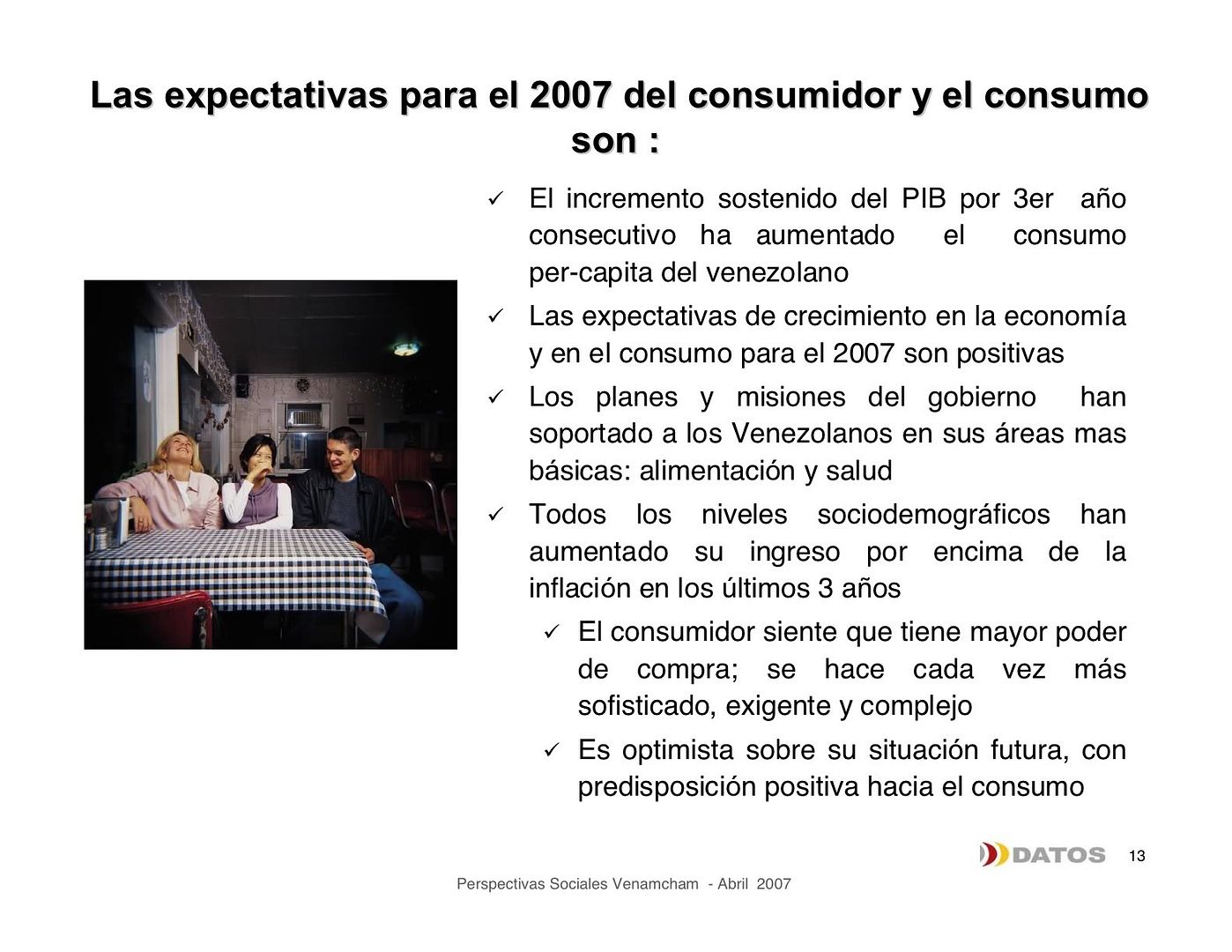
It reads:
The expectations for 2007 for the consumer and comsption are:
The sustained increase in GDP for the third consectutive year have increased the per capita consumption for Venezuelans.
The expectations for the increase in the economy and consumption for 2007 are postive.
The plans and missions of the government have lifted up Venezuelans in the most basic areas: food and health.
All social and demographic levels have had an increase in their real income over the past three years.
The concumer feels that they have more purchasing power; they have become consitantly more sophisticated, demanding, and complex.
They are optomistic regarding their situation in the future and are have a positive predisposition to consume.
Not much reason for an opposition politician to feel good about 2007 is there? Lucky for them, there aren't any major elections scheduled this years anyways because if there were that would be just one more set of elections for them to lose (thought I suspect given what happened on December 3rd of last year they would go back to their boycotting ways of 2005).
Better still for Venezuelans, it looks to stay this way for some time. OPEC has successfully defended prices and Venezuelan oil now selling again for the same price it sold for last year. Its international debts with the IMF and World Bank just got paid off (Wolfkowitz is going to have to fund his lovers with someone elses money), and even the venurable Sabana Grande boulevard is filling up with out door cafes where politics is debated and sales are up 40%.
If only the opposition knew how to kick back and enjoy. If they can't enjoy life now maybe they should seek out a good therapist.
|
Yet, when they are talking amongst themselves behind closed doors a different picture emerges. One of things are doing quite well, so well in fact that one probably wants to go out and invest right now to reap the rewards. And the Venezuelan consumer, rather than standing in imaginary lines caused by imaginary shortages, is doing quite well. Yes, yes, we already know consumption is way up under Chavez. But there is more to it than that.
To show this I won't use the normal number filled post that may have the effect of boring some. I'll cut straight to the executive summary given in this slide from the opposition (when they think know one is looking):

It reads:
The expectations for 2007 for the consumer and comsption are:
The sustained increase in GDP for the third consectutive year have increased the per capita consumption for Venezuelans.
The expectations for the increase in the economy and consumption for 2007 are postive.
The plans and missions of the government have lifted up Venezuelans in the most basic areas: food and health.
All social and demographic levels have had an increase in their real income over the past three years.
The concumer feels that they have more purchasing power; they have become consitantly more sophisticated, demanding, and complex.
They are optomistic regarding their situation in the future and are have a positive predisposition to consume.
Not much reason for an opposition politician to feel good about 2007 is there? Lucky for them, there aren't any major elections scheduled this years anyways because if there were that would be just one more set of elections for them to lose (thought I suspect given what happened on December 3rd of last year they would go back to their boycotting ways of 2005).
Better still for Venezuelans, it looks to stay this way for some time. OPEC has successfully defended prices and Venezuelan oil now selling again for the same price it sold for last year. Its international debts with the IMF and World Bank just got paid off (Wolfkowitz is going to have to fund his lovers with someone elses money), and even the venurable Sabana Grande boulevard is filling up with out door cafes where politics is debated and sales are up 40%.
If only the opposition knew how to kick back and enjoy. If they can't enjoy life now maybe they should seek out a good therapist.
|
